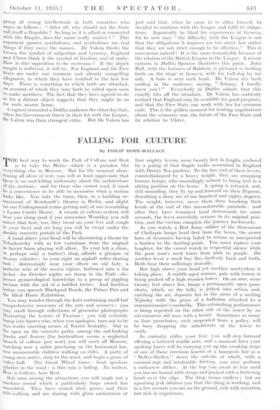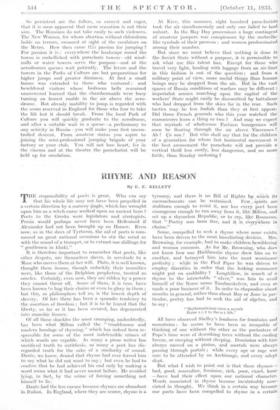FALLING FOR CULTURE
By PHILIP HOPE-WALLACE THE best way to reach the Park of Culture and Rest is to take the Metro—which is a paradox like everything else in Moscow. But for the moment aban- doning all ideas of rest, you will at least appreciate that here is no soul-killing uniformity abdut the architecture the stations : and for those who cannot read, it must '4)e vonycnience to be able to memorise what a station Alooks" like. You take the train, then, in a building re- ltliniseent of Reinhardt's theatre in Berlin, and alight (as our Underground terms getting out) at one resembling Lyons Corn r House, A swarm of culture-seekers will bear you along (and if you remember Wembley you will notice that here,\too, they tread on your feet and cough in your face) and ere long you will be swept under the shoddy concrete portals Of the Park.
A band above. your 'head will be discoursing a theme by Tehaikowsky with as few variations from the original as Soviet .brasS playing will allow. To your left a clinic, or perhaps only a barber's shop, affords a glimpse of steamy cubicles ; to your right an asphalt roller-skating fink ; distressingly near your elbow an old lady, a Pathetic relic of the ancien .regime, buttoned into a fur jacket—for October nights are damp in the. Park—dis- Penses gynaecological .knowledge to a group of giggling urchins with the aid of a .bottled foetus. And limitless before you spreads Blackpool Beach, the Palace Pier and the Ideal Home Exhibition.
You may wander through the huts containing small but Comprehensive museums of the arts and sciences you . may stroll through collections of gruesome photographs illustrating the terrors of' Fascism : you will certainly bUmp into figures who, when you apologise, turn out to be Wax-works enacting scenes of Tsarist brutality. Out in the open on the concrete paths, among the sad-looking shrubs and flowers (for horticulture seems a neglected branch of culture just now) you will meet all Moscow, Watching now a sailor practising on the horizontal bar, how innumerable children walking on stilts. A party of Young.men arrive, strip to the waist, and begin a game of Volley-ball. The Great Wheel turns : loud speakers splutter in the wind : a thin rain is falling. No matter. Iiere is Culture, here Rest.
• But soon among the attractions you will single out a Machine round which a particularly large crowd has assembled. They have ceased -their games and their stilt-walking and are staring with glum earnestness at four mighty levers, some twenty feet in length, enclosed by 'a paling of that fragile trellis associated in England with Dainty Tea gardens. To the free end of these levers, counterbalanced by a heavy weight, they are strapping human beings, who unsmilingly submit to being tied in a sitting position on the beam. A spring is released, and, still unsmiling, they fly up and forward on their Pegasus, describing a dizzy arc of one hundred and eighty degrees. The weight, however, saves them from breaking their heads at the end of this uncomfortable parabola : and after they have remained head downwards for some seconds, the lever mercifully returns to its original posi- tion, and the victims complete the journey backwards. As you watch; a Red Army soldier of the dimensions of Chaliapin hangs head first from the beam, the secret laws of dynamics having failed to return so unexpected it burden to the starting-point. You must repress your laughter, for the crowd watch in respectful silence while the poor man's neck turns from pink to purple. • , On another lever a small boy flies tirelessly back and forth. Both bear their sufferings stoically.
But high above your head yet another martyrdom is taking place. A middle-aged woman, pale with terror, is being pushed off a high wooden tower. On an arm, some twenty feet above her, hangs a. permanently 'open para- chute, which, as she falls, is jerked into action and, catching the air, deposits her in the arms of a smiling Nijinsky with the grace of a ballerina attached to a commissionaire's umbrella.. This astonishing performance is being repeated on the other side of the tower by an adventurous old man with a beard. Sometimes as many as four parachutes, each suspended from a pulley, will be busy dropping the inhabitants of the tower to earth.
As curiosity stifles your fear, you will step forward offering a tattered rouble note, and a moment later your quaking knees will be carrying you up the creaking steps of one of those erections known at a bourgeois fair as a " Helter-Skelter," down the outside of which, with a coconut-mat and intolerable friction, you may perform a corkscrew slither. At the top you await in fear until you too are bound with straps and pushed with a fluttering heart over the edge. The drop seems 'endless ; but an agonising jerk informs you that the thing is working, and in a few seconds you are on the ground, sick with sensation but rich in experience . So persistent are the fellers, so earnest and eager, that it is soon apparent that mere sensation is not their aim. The Russians do not take easily to such violenees. The New Women, for whom abortion without chloroform holds no terrors, swooned at sight of the escalators on the Metro. How then came this passion for jumping ? For passion it is : everywhere the landscape round the towns is embellished with parachute towers—old wind- mills or water towers serve the purpose—and at the aerodromes queues wait patiently. The levers and the towers in the Parks of Culture are but preparations for higher jumps and greater dizziness. At first a small bonus was extended to those who ventured : and bewildered visitors whose bedroom bells , remained unanswered learned that the chambermaids were busy turning an honest rouble in the air above the aero- drome. But already inability to jump is regarded with the scorn reserved in England for those who fear to take the lift lest it should break. From the local Park of Culture you will quickly graduate to the aerodrome, and after a suitable wait in a queue—a preliminary to any activity in 'Russia—you will make your first uncon- trolled descent. From amateur status you aspire to joining the semi-professional jumping brigade of yout factory or your club. You will not lose heart, for in the cinema and at the theatre the parachutist will • be held up for emulation. At Kiev, this summer, eight hundred parachutists took the air simultaneously and only one failed to land unhurt. In the May Day processions a huge contingent of amateur jumpers was conspicuous by the umbrella- like symbols of their prowess : and women predothinated among their number.
But since we must believe that nothing is done in the Soviet State without a purpose, it is permissible to ask_ what use this talent has. Except for those who travel very light, landing with luggage from an air-liner in this fashion is out of. the question,: and..from a military, point of view, more useful tbing?..than human beings may be dropped from the air. Dui- in the vast spaces of Russia conditions of warfare may. be different : imperialist armies marching upon the capital of the workers' State might easily be discomfited by battalions who had dropped from the skies far in the rear. Such tactics may be less foolish than they at first appear. Did those French generals who this year watched the manoeuvres learn a thing or two ? And may we expect that myriads of wholesome Parisian bourgeoises will soon be floating through the air above Vincennes ? Ah co non ! But who shall say that for. the children of a generation. for whom fast horizontal movement is the best amusement the parachute will not provide a vertical thrill less costly, less dangerous,. and no more futile, than Sunday motoring ?































































 Previous page
Previous page